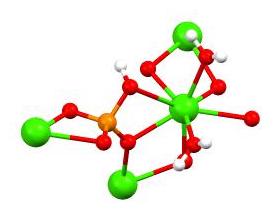Dicalcium phosphate
Dicalcium Phosphate (DCP), also known as calcium monohydrogen phosphate, is a chemical compound widely used as a dietary supplement in food production and animal feed. It is also utilized in various industrial applications, including as a toothpaste additive and in the manufacturing of tablets in the pharmaceutical industry. Dicalcium phosphate is recognized for its relatively high calcium content and its role in bone health and nutrition.
Composition and Properties[edit | edit source]
Dicalcium phosphate is composed of calcium cations and phosphate anions, with the chemical formula CaHPO4. It exists in several forms, including anhydrous (water-free) and dihydrated (containing two molecules of water). The anhydrous form is commonly used in powdered dietary supplements, while the dihydrated form is often found in toothpaste and certain food products.
Production[edit | edit source]
The production of dicalcium phosphate can be achieved through several methods. One common method involves the reaction of calcium carbonate (CaCO3) with phosphoric acid (H3PO4), resulting in dicalcium phosphate and carbon dioxide (CO2). Another method involves the controlled hydrolysis of monocalcium phosphate (Ca(H2PO4)2), which is itself produced through the reaction of calcium carbonate with phosphoric acid.
Applications[edit | edit source]
Food Production[edit | edit source]
In the food industry, dicalcium phosphate is used as a leavening agent, helping baked goods to rise. It also serves as a dietary calcium supplement in various fortified foods and beverages, contributing to the nutritional value of these products.
Animal Feed[edit | edit source]
Dicalcium phosphate is a common ingredient in animal feed, providing a source of both calcium and phosphorus, two elements essential for the growth and health of livestock. It is especially important in the diets of poultry and swine, where it aids in the development of strong bones and teeth.
Pharmaceuticals[edit | edit source]
In the pharmaceutical industry, dicalcium phosphate is used as a tablet excipient, meaning it acts as a binder to hold the ingredients of a tablet together. Its compatibility with a wide range of other drug ingredients and its non-reactive nature make it a preferred choice for this application.
Toothpaste[edit | edit source]
Dicalcium phosphate dihydrate is used in toothpaste as a gentle abrasive to aid in the removal of dental plaque. Additionally, its calcium content may contribute to the remineralization of the teeth.
Safety and Regulatory Aspects[edit | edit source]
Dicalcium phosphate is generally recognized as safe (GRAS) when used in accordance with good manufacturing practices. However, excessive intake of calcium and phosphorus can lead to health issues, such as kidney stones and impaired kidney function. Regulatory agencies in various countries oversee the use of dicalcium phosphate in food, feed, and pharmaceutical products to ensure it is used safely and appropriately.
Environmental Impact[edit | edit source]
The production and use of dicalcium phosphate have minimal environmental impact when managed properly. However, the sourcing of raw materials (such as phosphoric acid and calcium carbonate) and the disposal of by-products should be conducted in an environmentally responsible manner to minimize any negative effects.
Search WikiMD
Ad.Tired of being Overweight? Try W8MD's physician weight loss program.
Semaglutide (Ozempic / Wegovy and Tirzepatide (Mounjaro / Zepbound) available.
Advertise on WikiMD
|
WikiMD's Wellness Encyclopedia |
| Let Food Be Thy Medicine Medicine Thy Food - Hippocrates |
Translate this page: - East Asian
中文,
日本,
한국어,
South Asian
हिन्दी,
தமிழ்,
తెలుగు,
Urdu,
ಕನ್ನಡ,
Southeast Asian
Indonesian,
Vietnamese,
Thai,
မြန်မာဘာသာ,
বাংলা
European
español,
Deutsch,
français,
Greek,
português do Brasil,
polski,
română,
русский,
Nederlands,
norsk,
svenska,
suomi,
Italian
Middle Eastern & African
عربى,
Turkish,
Persian,
Hebrew,
Afrikaans,
isiZulu,
Kiswahili,
Other
Bulgarian,
Hungarian,
Czech,
Swedish,
മലയാളം,
मराठी,
ਪੰਜਾਬੀ,
ગુજરાતી,
Portuguese,
Ukrainian
Medical Disclaimer: WikiMD is not a substitute for professional medical advice. The information on WikiMD is provided as an information resource only, may be incorrect, outdated or misleading, and is not to be used or relied on for any diagnostic or treatment purposes. Please consult your health care provider before making any healthcare decisions or for guidance about a specific medical condition. WikiMD expressly disclaims responsibility, and shall have no liability, for any damages, loss, injury, or liability whatsoever suffered as a result of your reliance on the information contained in this site. By visiting this site you agree to the foregoing terms and conditions, which may from time to time be changed or supplemented by WikiMD. If you do not agree to the foregoing terms and conditions, you should not enter or use this site. See full disclaimer.
Credits:Most images are courtesy of Wikimedia commons, and templates, categories Wikipedia, licensed under CC BY SA or similar.
Contributors: Prab R. Tumpati, MD

